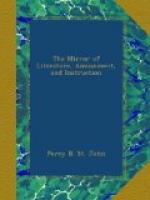As he ripened, he became tinged with the old gentlemanly vice. He almost made penury his hobby. Oxberry’s widow asked him, after his retirement, to play for her benefit: he said he could not, but that, if ever he performed again, he would present her with 100_l_. It is related of him too, that a friend asking him for a keepsake, he exchanged his old cotton umbrella for his friend’s silk one. Elliston and Munden were on good terms, though men of very opposite habits. Munden had played twelve nights for Elliston at Leamington. The manager had his wine, and the actor his brandy and water, in the greenroom; before leaving the town, Munden sent for his bill at the next tavern—14 glasses as many shillings. He asked Elliston to contribute 3_s_. which the manager refused to do, as Munden had drunk his wine; “but,” retorted Munden, screwing his features up to the very point of exaction, “Sip-pings, remember sip-pings,” alluding to Elliston’s occasional visits to his glass, while he was playing his part. It is said too, though we know not how truly, that Munden was once seen, walking to Kentish Town, with four mackerel, suspended from his fingers by a twig, he having purchased the fish at a low price in Clare-Market. But this is venial: for a string of fish is one of the parcels which John Wilkes said, a gentleman may carry. Munden was a willing diner-out, and his conviviality made him a welcome guest at any board. His hospitality at home was unbounded; and above all, he has left an exemplary character for honesty and integrity: he was one of those
Whose blood and judgment are so well comingled
That they are not a pipe for fortune’s
finger
To sound what stop she please.
Mr. Munden has left a widow, a son, and a daughter to share his well-earned fortune.
[1] The recital of these circumstances induced O’Keefe
to introduce the
incident in the part of Nipperkin,
in Springs of Laurel, or “Rival
Soldiers_”.
[2] Oxberry appeared on the stage for the last time,
this night, as
Corporal Foss.
* * * * *
THE SELECTOR; AND LITERARY NOTICES OF NEW WORKS.
MEMOIRS OF SIR RALPH ESHER,
By Leigh Hunt, Esq.
These volumes exhibit a lively picture of the gayest and most profligate periods of the history of the English Court. The writer, Sir Ralph Esher, is an adventurer in the Court of our Second Charles, where he is introduced by luckily securing a feather that escapes from the hat of one of the ladies of the Court on horseback. The work opens with some account of the writer’s family, of some antiquity, in the county of Surrey, with a few delightful sketches of the great men of the period. Witness this slight outline of
Cowley.




